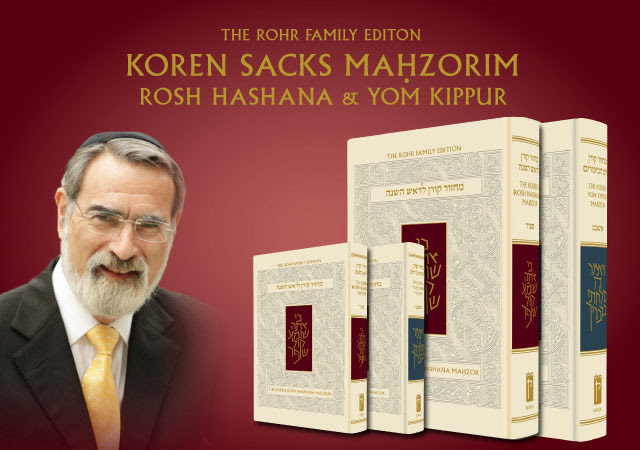
Leading up to Rosh Hashanah and Yom Kippur, Rabbi Sacks has written a series of short thoughts to help focus our minds on the challenges and opportunities of this special time in the Jewish calendar. You can also listen to each piece as they are released by subscribing to Rabbi Sacks’ iTunes podcast here. To buy your copy of the Koren Sacks Rosh Hashanah and Yom Kippur machzorim, please click here.
Jonathan Sacks
This year we approach the New Year with more fear and trembling than for a very long time. This summer, in Gaza, we saw Israel, at double risk of Hamas missiles and tunnels, forced into some of the most difficult choices a nation has ever had to make. How do you fight a war against terror when the terrorists take a whole people hostage and hide bombs and rocket launchers in schools, hospitals and mosques?
As Amos Oz asked, what would you do if your neighbour across the street sits down on the balcony, puts his little boy on his lap, and starts shooting machine gun fire into your nursery? The Torah says that when Jacob was about to meet Esau, after a separation of 22 years, he was ‘very afraid and distressed.’ Says Rashi: ‘very afraid’ that he might be killed. ‘distressed’ that he might have to kill. The commentators on Rashi ask the obvious question. You are allowed to kill in self defence. So why was Jacob distressed that he might have to kill a man who was about to kill him. The short answer is that if life matters to you, you are distressed even if you are morally justified. This summer, Israelis and Israel had to defend itself but it did so with no joy, only distress.
This was also the summer in which antisemitism reappeared with a vengeance in the streets of Europe, the old antisemitism of the far right and far left, and the new antisemitism that demonizes Israel and seeks not peace but destruction. I sensed a wave of anxiety go through the Jewish world. Is this it? After all the tears and tragedies of the past do we still have to live in fear? Is Jewish history Groundhog Day? Do things never change?
To which I think one of the answers is the key word of this time of the Jewish year. Teshuvah. Repentance. I think teshuvah is one of the most remarkable ideas ever to have entered the human mind. Teshuvah tells us that history can change because we can change. Our character is not pre-programmed in our genes. We can act differently tomorrow than we did yesterday. Yesterday’s enemies can be tomorrow’s friends. It happened between Israel and Germany, Israel and Egypt, Israel and Jordan. History can change because we can change and we are the makers of history. And my deepest prayer this year is that Israel’s enemies, its neighbours change too because then we can, together, write a new chapter in the history of the Middle East, a chapter of joy not of distress.
But just think about Israel for a moment. Jews hadn’t formed an army since the days of the Bar Kochba rebellion almost 19 centuries ago, yet they did so brilliantly to defend their land. For two thousand years, rarely were Jews farmers, yet in Israel they became the world’s great agricultural innovators. Because of the vicissitudes of Jewish history no people has changed more dramatically and more often than Jews, and yet throughout it all we stayed loyal to our fundamental principles: justice, compassion, love of life, love of children, love of study, argument and the life of the mind.
U-teshuvah u-tefillah u-tzedakah ma’avirin et roa hagezerah. Penitence, prayer and charity can avert the evil decree. There is nothing inevitable in the affairs of humankind. The greatest gift God gave us was the ability to change. Jews never accept defeat. Because of that, after all the hammer-blows of history, we are still undefeated.
Yes, there have been tough times in recent months. But consider this. In almost 4,000 years of Jewish history never before have we had simultaneously independence and sovereignty in the land of Israel, freedom and equality in most countries outside. To paraphrase an old Hasidic saying: If things are so bad, how come they’re so good? This year, let us first thank God for all the good in Jewish life, then let us ask Him for the strength to change the rest.
Jonathan Sacks









